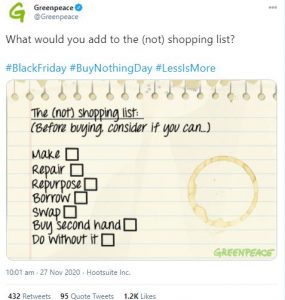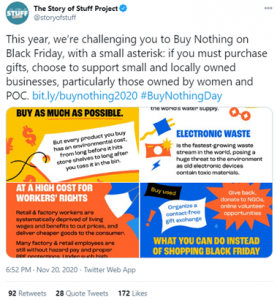In the face of a particularly difficult financial year, a growing percentage of consumers are rethinking Black Friday and Cyber Monday engagement, opting to instead celebrate #BuyNothingDay or buy from small and locally owned businesses.
Black Friday has seen an exponential rise among brands in the last decade, delivering enormous potential for retail sales: in the last year alone, the UK spent £8.6 billion during the Black Friday sales period.
However, across social media there has been growing awareness and recognition of the environmental and social effects of such a rampant period of expenditure, seeing the advent of the #BuyNothingDay hashtag.
Outdoor clothing brand Patagonia has always been a major example of a successful business promoting ethical and sustainable business practices, publicizing its ‘Don’t Buy This Jacket’ campaign to encourage individuals “to buy less and to reflect before you spend a dime on this jacket or anything else” since 2011.
Several activist groups have been formed and are gaining online traction to further this cause, using social platforms to encourage young shoppers to re-evaluate their relationship with fast fashion.
In the context of this year’s COVID-19 pandemic particularly, these campaigners and collectives have also urged a move away from high street clothing brands, to instead focus on locally owned businesses.
Patagonia has also previously used this opportunity to run campaigns to fund grassroots environmental groups through the proceeds of this sale, a practice which has also seen traction among many retailers during this period on Instagram particularly.
Heralding a Green Friday, businesses give to various environmental charities, highlight conscious products, and promote others doing the same. Even Amazon, who itself receives a substantial amount of criticism concerning ethics and the rights of workers during this period particularly, has its own platform for charitable organisations to enrol to receive donations based on purchases made through the site.
All of this points towards a shifting landscape in fashion retail. Shoppers are voicing concerns about the ethical and environmental practices of major fashion brands, eschewing overconsumption and turning to considerations of waste and sustainability.
As ever, social media is their means of campaign and activist. Not only the domain of the retail fashion influencer, encouraging us to buy every new fashion available, it is also the home of those encouraging us to do the opposite.
As Nicholas Robin, curator of Green Friday, says of fast fashion in the Environmental Journal: “It costs you [the same] as a burger and fries and therefore it has little value to you, it can be treated as a disposable product. This culture has to change, fashion as-usual, has to change, with Green Friday, fashion can still be fun, but let’s buy less, share more, and upcycle.”

 Social Due Diligence
Social Due Diligence 



